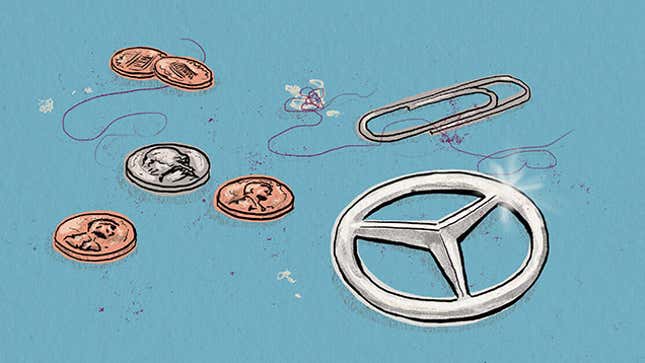White Lady Drives Mercedes to Pick Up Food Stamps; Chaos Ensues
Latest

Darlena Cunha had it so good in 2008 for a white woman from an affluent suburb with a college degree: She and her husband earned $120k, twins on the way, a house worth $250k. Then the market crashed, husband lost his (journalism) job, and the preemies needed costly formula. Their solid middle class income now clocked in at $25k, so they turned to WIC.
However, they did not immediately sell one thing that everyone on the Internet seems to think they should have: A 2003 Mercedes.
To be clear, Cunha’s story is not an uncommon one from the past several years, as we watched as more and more middle class folks lean on government assistance to buoy them through the bleak economy. Those high numbers eventually were said to have led to a decrease in the stigma surrounding government assistance.
But in 2008, that was still not the case, and Cunha’s story is one person’s account of being a middle class person suddenly navigating the world as something she never imagined she could be: poor. She hated “the stares, the faux concern, the pity” and, especially, being told what she should and shouldn’t buy.
Once, a girl at the register actually stood up for me when an older mother of three saw the coupons and started chastising my purchase of root beer. They were “buy two, get one free” at a dollar a pop.
“Surely, you don’t need those,” she said. “WIC pays for juice for you people.”
But it was nothing compared to the grief she took for still owning a 2003 Mercedes, a car that, even old and paid off and showing the signs of wear and tear, still telegraphs affluence to most people, and that cannot coexist with government assistance.
Over and over again, people asked why we kept that car, offering to sell it in their yards or on the Internet for us.
“You can’t be that bad off,” a distant relative said, after inviting himself over for lunch. “You still got that baby in all its glory.”
Sometimes, it was more direct. All from a place of love, of course. “Sell the Mercedes,” a friend said to me. “He doesn’t get to keep his toys now.”
But the thing was, Cunha insists, the Mercedes was paid off. It belonged to her husband, and we are not told why or how he purchased in the first place (He was a copy editor at a newspaper), and I for one am glad she didn’t explain it. Because fuck the haters. Cunha gets one essential aspect of poverty right, even if she learned it in reverse. You keep what little nice shit you had or can get your hands on, because it is a buffer against the deprivation. Most people never get the nice stuff in the first place.
Were we supposed to trade it in for a crappier car we’d have to make payments on? Only to have that less reliable car break down on us?
And even if we had wanted to do that, here’s what people don’t understand: The reality of poverty can spring quickly while the psychological effects take longer to surface. When you lose a job, your first thought isn’t, “Oh my God, I’m poor. I’d better sell all my nice stuff!” It’s “I need another job. Now.” When you’re scrambling, you hang on to the things that work, that bring you some comfort. That Mercedes was the one reliable, trustworthy thing in our lives.
So it’s no surprise that commenters (now nearing 5,000 on her piece) are having a field day with calling bullshit on her choices:
Says JohnDoe44:
This story bothers me on multiple levels. For one, it is obivious that the mercedes should have been sold and a cheaper more reliable car should have been bought. If this was done there would be more money to spend elsewhere (where its actually needed). Lets be honest though, we all know why she didnt sell the Benz, its because she was trying to hide behind it, its clear she has always tried to put up some sort of facade for her life. She clearly likens to the status symbols and not pure logic. God forbid she be seen in a 98 Honda.
Wc125 says:
-

-

-

-

-

-

-

-

-

-

-

-

-

-

-

-

-

-

-

-

-

-

-

-

-

-

-

-

-

-

-

-

-

-

-

-

-

-

-

-








































